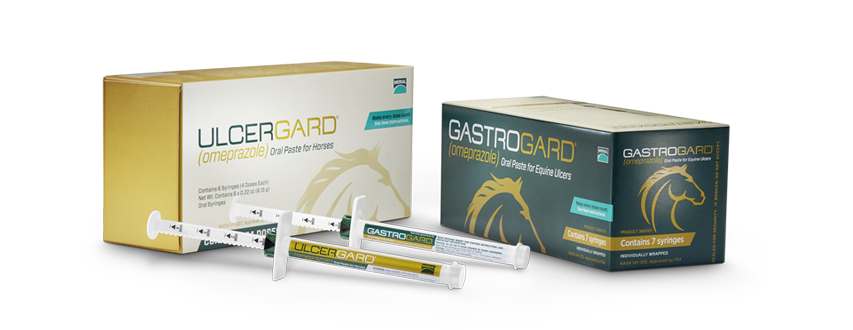When horses frequently encounter high-stress situations, their bodies are more likely to produce negative responses. Events like competition, frequent travel, and new environments can cause general wear and tear on the gastric system of your horse. As a result, horses that travel and compete regularly are often given UlcerGard or GastroGard to protect their bodies from gastric ulcers.
Gastric ulcers occur in horses when their stomach produces an excess amount of acid. Frequent stress, increased stall time, and limited opportunity to graze are all factors of increased acid production. However, eliminating these factors is not always an option for horses in constant competition. Many equestrian professionals are forced to turn to medications that control gastric acid production.
The Power of Omeprazole
Omeprazole is the leading ingredient for curing and preventing ulcers in horses. The most popular source of omeprazole formula is found in UlcerGard and GastroGard. Manufactured by Boehringer Ingelheim, UlcerGard and GastroGard are almost identical ulcer medications. While many horse owners use these treatments interchangeably, there are some differences between the two products.

What’s The Difference?
The difference between UlcerGard and GastroGard is small but significant. GastroGard is dosed in a specific amount for ulcer treatment, and the quantity of omeprazole formula is designed to help cure gastric ulcers. On the other hand, UlcerGard is designed to prevent gastric ulcers after they have already been treated. Therefore, UlcerGard is dosed for a smaller amount of paste given per tube.
Both GastroGard and UlcerGard contain the exact same amount of active ingredient. The only visible difference between the two medications is in how the tubes are labeled and marked. UlcerGard is marked by dose, and each tube contains four doses. GastroGard is marked by weight, and each tube allows for dosing up to 1250 pounds.
Because the dosing amount for GastroGard is higher than UlcerGard, it requires a prescription from a veterinarian. However, UlcerGard’s smaller dosing amount does not require a prescription. Need to purchase UlcerGard or GastroGard? We have both! For UlcerGard, shop here. Shop GastroGard here.
Whether your horse is being treated for ulcers with GastroGard, UlcerGard, or has been treated previously, be sure to talk to your veterinarian before putting your horse on any form of medication.
Disclaimer: Prescription drugs are potentially and inherently dangerous if not used correctly. Always consult your licensed veterinarian prior to beginning any new regimen. Always check with your governing regulatory organization to ensure medication is competition safe prior to use.


1 Pingback